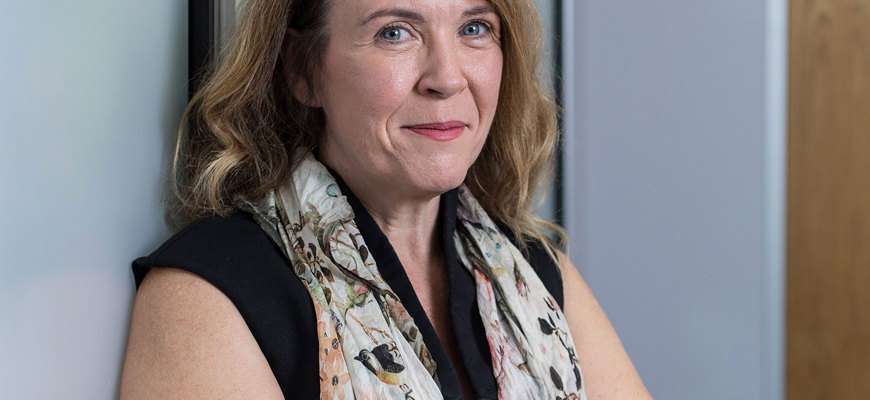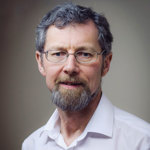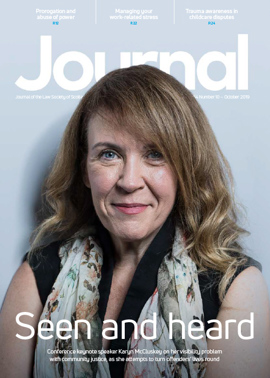Face of the invisible

“I’ve said you can ask me anything. I’m relatively candid; I get myself into trouble constantly.” If you think of Law Society of Scotland conference addresses as set-piece affairs, Karyn McCluskey’s slot at this month’s event might be different.
What is billed as a “fireside chat” is unlikely to have quite such a cosy feel. Head of Community Justice Scotland, itself perhaps a comfortable-sounding name, her world is that of violence, drugs, abuse, neglect, poverty, homelessness and the melting pot of other issues that govern the lives of the people she is trying to help.
But what is community justice (with capital or small letters)? McCluskey is the first to admit that the concept has an invisibility problem: “I’m not like a jail or a hospital that you can see. I don’t have something that says ‘Community Justice’.” Fundamentally it is about trying to prevent offending, in particular reoffending by those who have been through the justice system. To do this it operates in many ways, partnering with others in localities all over Scotland. Case studies on its website (communityjustice.scot) feature projects alongside stories from individuals who have been helped to turn their lives round, and who McCluskey tries to involve in persuading others that it can be done.
As an umbrella body, she adds, “We have no power, only influence. It’s fundamentally about speaking to people. I have to make friends and influence people. I think in the first year we set up I spoke to 23,000 people face to face, and about 16,000 last year.” That is by going out to local authorities, parents’ groups, community bodies of all descriptions. In addition she does radio, press articles, a Ted talk... and now the conference.
Explore the data
Someone who has always had an interest in human behaviour, it was when McCluskey took a Masters in forensic psychology that her study of offenders really took off, looking at gangs and armed robbery teams and their behaviour profiles.
After periods in Sussex, Lancashire, West Mercia and the Metropolitan Police, she returned to her native Glasgow, around the peak of the knife crime epidemic of the early 2000s, and was tasked with coming up with proposals. From a hospital consultant friend she knew that many of the victims wanted nothing to do with the police. However, the then chief constable Sir Willie Rae wanted the full picture: “Flush everything out. Don’t hide anything, just tell us.” Which, given that some people wanted to suppress bad news, “was incredibly bold of him”.
She has an illustration of her favourite question, “What else could this look like?” – how she looks for alternative approaches to available data. She learned that a bus company had a problem of seats being slashed, so started working out the likely routes and times of day. “And then we stopped and searched the buses at certain times. So it was just thinking about it in a very different way. It’s about how else can you change it and move into prevention.”
McCluskey also praises Rae for giving her the scope to try things, and fail sometimes. “He let us fail, and sometimes spectacularly. And he didn’t berate us, the ‘terror of error’ that everybody gets. He allowed us to say things didn’t work.”
It took time, but the violent crime rate came down, and has mostly stayed down. “It has come down in terms of crime figures, but I’m most interested in people going through the hospital doors. I always said our measure of success was about reducing that number. Because if you think about it, emergency rooms are the passive receivers of the injured. They couldn’t make any difference, but we could.”
But the problem is never beaten, as London has recently found out the hard way. “People always say that when things get better they can take their foot off the gas, but actually when things get better you need to work even harder. Because things can always get worse. And it’s sometimes the people that are left who have the more difficult, thorny issues, so now we get into poverty and a whole range of other really complicated problems. You just need to look at the drug death figures right now, to realise that we are far from fixed.”
How many chances?
Indeed, Scotland’s drug death rate is at an all-time high. Has that overtaken violence as McCluskey’s biggest concern? “Listen, it’s all part of the same thing. I am not a drugs expert. I think I’m really quite expert in practical public health, that’s what I say I do. Practical prevention. I try not to do a lot of theory, but I understand what the evidence base is and how you move in an evidence-based way.”
Asked if there is a community justice answer, she admits she is still at the stage of trying to understand what is happening. “Because I’ve never been a drug addict I’ve never lived in the level of chaos that some people find themselves in, so it’s been really important understanding what people think will work.
The best person to tell you how to get out of a hole is the person who’s done it already. People who are in recovery, people who may be managed on: there’s a big debate at the moment about whether you need abstinence or whether you can use methadone and suchlike. We need to look at the evidence and it needs a broad church.
“Not everybody is the same, and not everybody succeeds first time. Even some people in community justice say, they’ve had a chance at community service but they’re still doing it. I keep telling them, see when you’re trying to change your behaviour, lose weight, stop smoking, do more exercise, did you manage it first time? Of course you don’t. People need lots and lots of goes at changing their behaviour, and that’s really difficult for the broader public to understand.”
That brings us to the work of the specialised courts, something McCluskey very much supports. “People always talk about problem-solving courts. I talk about problem-solving sheriffs. Problem-solving lawyers. Because that’s what you really need to think about.” She praises sheriffs such as Frank Crowe and David Mackie, both now retiring, as well as solicitors like Iain Smith in Livingston and Tony Bone in Kilmarnock, who try to have their clients “seen as human beings, and to understand what might need to be put in place to improve their lives and stop them offending”. It’s something she believes is not found elsewhere in the UK.
Even ahead of the new presumption against prison sentences of less than 12 months, she states: “Our sheriffs are actually very thoughtful already, and I know that that’s probably not the narrative that lots of people would like me to say. I think our understanding of risk is actually very good. Our criminal justice social workers have a really good understanding. That goes in the court reports, I think our sheriffs absolutely accept that, and the protection of the public is always their top priority.” But there are still people going to prison because they have an addiction and the services are not there to help them, or they are homeless. And how many of the 1,615 people currently on remand could benefit from bail support and supervision, with electronic monitoring?
ACEs, and other factors
Another, sometimes controversial, area of interest is the ACEs-aware approach, dealing with the continuing effects of trauma experienced in childhood. It has its detractors as well as its supporters, but again McCluskey has seen a positive response from some offenders, who in the past may simply have been handed a diagnosis by a psychiatrist. “For the first time I’ve actually had people saying, ‘This isn’t an excuse, but this is why I sometimes feel the way I feel, why I behave in certain ways.’ And it fits for some people. I know it’s more complicated than that, but at least it’s started a discussion about some of the trauma people suffer when they’re young and right the way through. So for me it’s always about an understanding.”
One criticism of the approach is that it fails to focus on the effect of poverty. McCluskey is not at risk of doing likewise. “Let’s not pretend that abuse and neglect, having your parent go to prison, don’t affect people. It’s very divisive, and I’d rather get a bit of consensus that we realise these things are important, we should absolutely think about how we mitigate them, but don’t lose sight of the big poverty. Poverty is the parent of crime. Aristotle said that 2,500 years ago. But I don’t think that’s a unique correlation because there are lots of people in poverty: there are other things that happen.”
Even those seeking solutions to others’ problems, she adds, can be “overwhelmed into doing nothing” by the complexity of the situation, “and we have to make it simple enough that people think, I can make an effect there”.
She continues: “See when you’re dealing with a complex situation – they’ve got drugs, abuse, neglect, they’ve got imprisonment, they’ve got poverty, homelessness – it’s incredibly complex, it’s 1,000 moving parts. And it’s really loose at the moment. It’s not really working for people, in truth. We always say we want to be the safest country. I think we could; there are only five and a bit million of us, we’re connected and we could make a difference, but there are too many of our citizens who have a different outcome. Life chances aren’t created equally. They just aren’t.”
Does McCluskey have to be a disruptor to get things done – and if so, where?
“I’m definitely disruptive. You can’t disrupt everything. There are things that work, that just need to be improved. But sometimes systems don’t change just because it’s the right thing to do. I used to think people would do the right thing because it was the right thing to do, and then I quickly learned that they don’t. I do know quite a few disruptors actually within the public services, and in places you wouldn’t think about.
“Sometimes you need to disrupt the system to make change. We needed to do that in violence, and we certainly need to do it in justice. For example, if you don’t have a demand for a service, local authorities won’t commit to that service. But what if, because you don’t have that service, people don’t get diverted to it? So then you need to create a demand for the service to be commissioned, to make sure that people don’t end up in the justice system who don’t need to be there. That’s really tricky.”
Public image
Is populism her big enemy – the “soft touch justice” refrain of some politicians and media? McCluskey just covers her face when reminded of the new Home Secretary’s desire to make criminals “terrified” of offending (“Some of them are terrified anyway. But we like dichotomies, don’t we?”), but believes the Scottish media are less extreme.
That however is where the invisibility problem kicks in – as was confirmed to her by David Dinsmore, chief executive of The Times and The Sun. She concedes he’s right, hence her mission to go before the public at every opportunity. “I tell people about all the success stories, about people’s lives that we’ve transformed. And they absolutely are transformed. I’ve seen lives utterly changed – people who get into work, people who are great parents, and who lead good lives. The problem is, the public can’t see it. I get caught in that dichotomy between, I won’t even say it, the hard and soft justice. So I’ve always talked about smart justice and doing evidence-based stuff, but he’s right. It’s invisible.”
Anything could happen at her conference presentation, then. To quote McCluskey out of context, “You have to be everything to everybody!” One thing, for sure, she is unlikely to be lost for words – sometimes it seems the thoughts are almost competing to come out of her.
It will also be a message of not shrinking from the challenge. “The things that drive people into offending are complex, complicated. We will never get to the stage where we think that it’s fixed, but I think we can make it better.We absolutely can make it better.”
More conference highlights
- Opening keynote address from Baroness Helena Kennedy QC: “Law and politics in an age of disruption”
- Keynote session: “The 21st century general counsel”, with Bjarne P Tellmann of Pearson – previewed at Journal, September 2019, 22
- Keynote presentation: Jacquelyn Maclennan, White & Case, London and Brussels, and teacher in legal ethics, business and human rights
- Plenary panel discussion on the future of the profession
- Choice of breakout sessions covering leadership, in-house, risk management, human rights, government and constitution, vulnerable witnesses and accused, agile working, LegalTech, business and financial crime, the next 100 years, and more
- Exhibition of services to the solicitors’ profession
The conference takes place at the Edinburgh International Conference Centre on Friday 25 October from 9.40am-5.30pm (registration from 8.30am).
All delegates will receive six hours of CPD, plus access to watch all sessions post-event and online at your convenience.
For further information and to book, go to www.lawscot.org.uk/annualconference
Regulars
Features
Briefings
- Law fair for the high street
- It's time for home truths
- No hope at age 16?
- Drug driving
- Licensing and the public health objective
- Constructing the new framework
- Scottish Solicitors' Disipline Tribunal
- Calling-up: the questions continue
- Reverse charge: don't sit back
- The anomaly that is immigration bail







